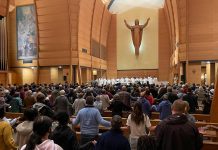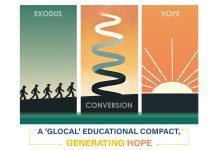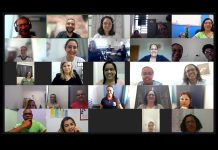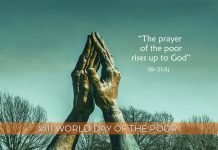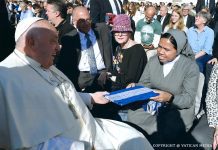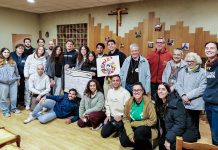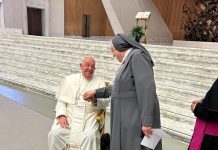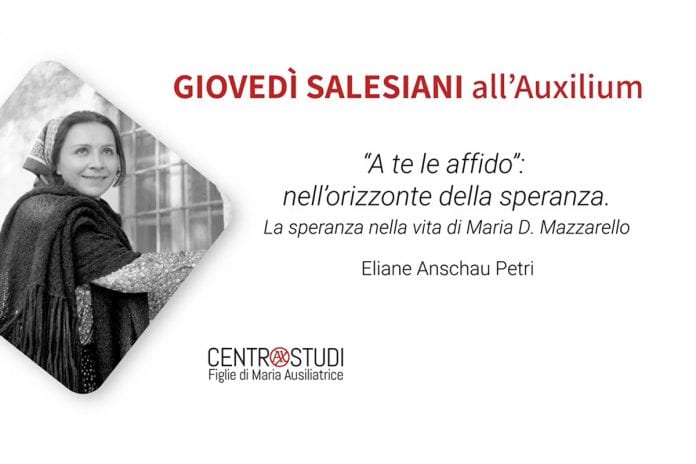Rome (Italy). March 4, 2021, was the fifth appointment of the “Salesian Thursdays at Auxilium”, online insights on issues of pedagogy, spirituality, and history of the Daughters of Mary Help of Christians, organized by the Center for Studies on the FMA of the Pontifical Faculty of Educational Sciences “Auxilium” in Rome.
Professor Eliane Petri, FMA, in continuity with the preceding appointment, studied the theme: “I entrust them to you: on the horizon of hope”, in the context of the three-year period of preparation for the 150th anniversary of the foundation of the Institute of the Daughters of Mary Help of Christians, who in 2021 are invited to study in depth the mandate “I entrust them to you“.
The theme of hope, which is revealed in all its relevance in the time that is being lived and is highlighted by Pope Francis in the interventions of his Magisterium, and by the Rector Major of the Salesians of Don Bosco in Strenna 2021, was presented in dialogued form, starting from some leading questions that favored the path of reflection on the life of holiness of Mary Domenica Mazzarello, Co-founder of the FMA Institute.
What are the foundations of hope in Mary Domenica Mazzarello?
Prof. Petri highlighted as the foundations of hope, unshakable trust in God, the Provident Father, and the gaze on reality from the final perspective of Christian life. Some phrases of encouragement to the sisters, “never be discouraged by any adversity, take everything from Jesus’ hands, put all your trust in Him and hope everything from Him” (L 65,1), and the gestures of invitation to look at the Crucifix , lead to the source of hope which for Mother Mazzarello is the certainty that of not walking alone. Her hope moves in her the will to desire heavenly goods and to live abandoned to God’s Providence. Hope therefore means living in expectation, in the joyful certainty of being “created for Heaven”.
What are the events of her life where hope shines?
Two experiences that strongly marked the life of Mother Mazzarello are the typhus illness and the mandate “I entrust them to you”. Mary Domenica lives the time of sickness and convalescence in the logic of faith, hope, and love where the will to serve God and others prevails over fear and uncertainty: “During her convalescence, she does not close in on herself, in her suffering which could be a risk, but she reacts in a resilient way, seeking what God wants from her”. Thus, in the Vision of Borgoalto and in that “I entrust them to you”, she feels that God inspires her with something great, to give her life for the education of girls. These steps, not without suffering, lead her to “roll up her sleeves”, to involve others in her project, and to courageously make the choices that lead to the expansion of the Institute.
In the encyclical Spe Salvi, Pope Benedict XVI speaks of some ‘places’ for learning and exercising hope: what are they in the life of Mother Mazzarello?
Sr. Eliane focuses attention on three fundamental ‘places’ for Mother Mazzarello: prayer, educational action, illness and suffering. In prayer, Mary Domenica presents her efforts and frailties, drawing the strength to go forward and live the mission. It is a prayer that is life, becomes life, and forms us to hope. Educating is the art of hoping, of not giving in to difficulties, and of believing in young people while respecting the path of each one. The suffering experienced, starting from family vicissitudes, leads Mary Mazzarello to reveal herself as a ‘mother’, in an authentic spirit of faith and self-giving, and to encourage others to overcome themselves, to overcome the tiring moments.
What message for us today?
Prof. Petri concludes her presentation with an expression from Fratelli Tutti of Pope Francis, in which we find the experience of Mary Domenica Mazzarello and which helps to live this difficult time of pandemic as a ‘formative’ place:
“Christian hope speaks to us of a thirst, of an inspiration, of a yearning for fullness, of a fulfilled life, of a confrontation with what is great, with what fills the heart and elevates the spirit towards great things, such as truth, goodness, beauty, justice, and love […] Hope is bold, it knows how to look beyond personal comforts, the small securities and compensations that narrow the horizon, to open up to great ideals that make life more beautiful and dignified”. (FT 55)


